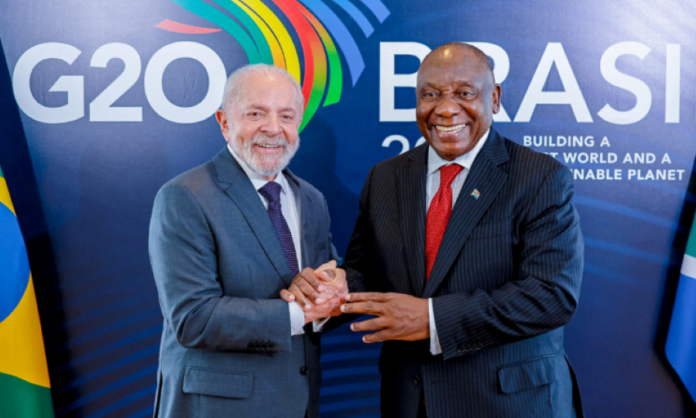The G20 Rio de Janeiro Leaders’ Declaration, adopted in November 2024, provides a groundbreaking framework that underscores the transformative role of arts and culture in fostering global unity, sustainability, and dialogue. For Africa, this declaration arrives at a pivotal juncture, offering an opportunity to assert the continent’s cultural richness as a driver of global progress. However, the real challenge lies in translating this aspirational framework into actionable policies that address the struggles faced by the arts and culture sector across Africa.
A Historic Leadership Opportunity
In an unprecedented milestone, South Africa assumed the G20 presidency following the conclusion of the summit in Rio de Janeiro. This marks the first time an African nation has held the reins of this influential global forum. President Cyril Ramaphosa’s declaration that Africa’s development will be central to the G20 agenda under the theme “Solidarity, Equality, and Sustainability” reflects a commitment to inclusive growth, food security, and the exploration of technologies like artificial intelligence (AI). Yet, while these goals are commendable, the omission of arts and culture from the list of priorities highlights a recurring oversight: culture, despite its significant economic and social contributions, remains underrepresented in global development discussions.
Culture’s Untapped Potential in Africa
Culture is not merely a repository of traditions or entertainment—it is an economic powerhouse, a vehicle for social cohesion, and a spark for innovation. Across Africa, however, the arts and culture sector faces chronic underfunding and neglect. The African Union’s pledge to allocate 1% of national budgets to culture by 2030 is a step in the right direction, but implementation has been inconsistent. Countries like Zambia allocate less than 0.1% of their budgets to cultural initiatives, a stark disparity given the sector’s potential to diversify economies and create jobs.
Artistic Freedom and Policy Gaps
One of the key pillars of the G20 declaration is the promotion of artistic freedom, a principle that resonates deeply in Africa, where creators often face challenges such as political interference, censorship, and economic insecurity. In nations like Mozambique and Uganda, the absence of robust legal protections leaves artists vulnerable. The G20’s emphasis on fair pay and decent work for cultural workers is promising, but without active enforcement mechanisms, these commitments risk remaining abstract ideals. African artists need champions who can advocate for their rights and ensure that international policies translate into tangible protections on the ground.
The Digital Frontier and Copyright Challenges
Digital platforms and AI offer both opportunities and challenges for Africa’s creative industries. The Salvador da Bahia Declaration, crafted during the G20 Culture Ministers’ meeting, calls for equitable policies in the digital sphere, including robust copyright enforcement and fair remuneration for creators. This is particularly relevant in African countries like Nigeria, where a thriving music industry continues to grapple with piracy and exploitative contracts. By leveraging the G20 platform, Africa can advocate for international frameworks that address these vulnerabilities, ensuring creators are fairly compensated in the digital economy.
Heritage Preservation and Restitution
Africa’s cultural heritage is not only a source of identity but also a vital link to its historical legacy. However, this heritage faces existential threats from climate change, conflict, and illegal trade. The G20’s commitment to safeguarding cultural memory aligns with the African Union’s Agenda 2063, which prioritizes the restitution of looted artefacts as a step toward healing and reclaiming African identity. South Africa’s G20 presidency presents an opportunity to bring these issues into sharper focus on the global stage, ensuring that heritage preservation and restitution are recognized as essential components of sustainable development.
A Platform for Unity and Advocacy
South Africa’s leadership at the G20 provides a unique platform to spotlight the continent’s rich cultural diversity and advocate for its integration into global development agendas. For South Africa, this is a chance to showcase its achievements in culture, heritage, and innovation. For the broader continent, it is a rare opportunity to unite around shared goals such as increased public investment, stronger protections for artistic freedom, and improved access to global markets.
By prioritizing culture as a core pillar of development, Africa can redefine its narrative on the global stage. Creativity is not just an expression of identity; it is a cornerstone for economic growth, social cohesion, and sustainable progress.
Seizing the Moment
The question is not whether Africa has the capacity to lead in cultural advocacy but whether it will seize this historic moment. South Africa, as the G20 president, has the power to champion a transformative cultural agenda that benefits the entire continent. By doing so, it can demonstrate that culture is not secondary to development but integral to achieving a future of equality, solidarity, and sustainability. Let this presidency mark the beginning of a new chapter where Africa’s artistic and cultural potential takes center stage in shaping a more equitable and inclusive global order.
















 The African Research (AR) Index is a comprehensive scholarly directory and database focused explicitly on journal publishers that publish and disseminate African research.
The African Research (AR) Index is a comprehensive scholarly directory and database focused explicitly on journal publishers that publish and disseminate African research.

